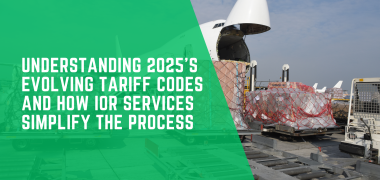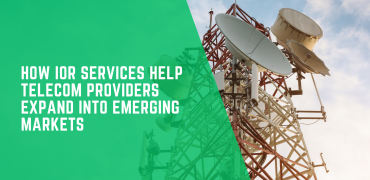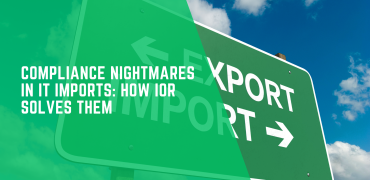Introduction
As global trade regulations continue to evolve, businesses in IT, telecom, and various other industries must stay ahead of the changing tariff codes. Tariff classifications impact import duties, compliance requirements, and logistics, making them crucial for companies engaged in international trade. However, with constant updates in 2025’s tariff codes, navigating this landscape has become more complex than ever.
One solution that helps businesses streamline the import process while ensuring full compliance is the Importer of Record (IOR) service. In this article, we will explore the changes in tariff codes, their impact on businesses, and how IOR services simplify the import process.
What Are Tariff Codes and Why Are They Important?
Tariff codes, also known as HS (Harmonized System) codes, are standardized numerical classifications assigned to goods traded internationally. These codes, maintained by the World Customs Organization (WCO), determine import duties, taxes, and compliance requirements for specific products.
For IT and telecom companies, proper classification of products such as servers, networking equipment, and telecommunications devices is critical. Incorrect classification can lead to:
- Higher import duties
- Shipment delays due to customs holds
- Fines and legal penalties
Changes in 2025’s Tariff Codes
In 2025, significant revisions have been introduced to HS codes, affecting various industries. Some key updates include:
- Enhanced Digital Product Classification – New subcategories for emerging technologies such as AI-powered devices, IoT equipment, and 5G infrastructure.
- Stricter Compliance for IT and Telecom Equipment – Countries are enforcing more stringent regulations to ensure cybersecurity, data protection, and environmental sustainability.
- Increased Scrutiny on Country of Origin – Changes in international trade agreements mean that specific tariff codes now require additional proof of origin documentation.
These updates add complexity to the import process, making it necessary for businesses to rely on expert import management solutions like IOR services.
Challenges Businesses Face with Evolving Tariff Codes
With these changes in 2025, businesses face multiple challenges when importing goods, including:
1. Complexity in Classification
Determining the correct tariff code for IT and telecom products can be confusing, especially when new categories are introduced. A single misclassification can result in penalties or delays.
2. Regulatory Compliance Issues
Governments worldwide are tightening compliance regulations to protect national security and data integrity. Importing without meeting the latest compliance requirements can lead to shipment seizures or rejections.
3. Unexpected Costs
Incorrect tariff classification may lead to higher duty rates, unexpected customs fees, and penalties, increasing overall import costs.
4. Delays in Customs Clearance
Customs authorities require accurate paperwork, including updated tariff codes, to clear shipments efficiently. Errors in classification can cause significant delays, affecting project timelines and business operations.
How IOR Services Simplify the Import Process
IOR services provide a seamless solution to managing international imports, especially in industries impacted by frequent tariff updates. Here’s how IOR services help:
1. Expert Tariff Code Classification
IOR providers stay updated on the latest HS code revisions, ensuring that products are accurately classified. This prevents businesses from paying excessive duties or facing regulatory hurdles.
2. Full Compliance with Import Regulations
IOR services handle all compliance-related tasks, including licensing, documentation, and customs requirements, ensuring that shipments meet 2025’s latest regulations.
3. Legal Responsibility for Imports
As the official importer, the IOR assumes responsibility for:
- Paying duties and taxes
- Filing necessary documentation
- Ensuring regulatory compliance
This reduces risks for businesses and allows them to focus on their core operations.
4. Faster Customs Clearance
IOR providers work closely with customs authorities to ensure that shipments clear without unnecessary delays, minimizing supply chain disruptions.
5. Cost Efficiency and Risk Reduction
By leveraging an IOR service, businesses avoid unexpected costs related to non-compliance, penalties, and customs rejections. This allows for more predictable financial planning.
Why IT & Telecom Companies Need an IOR in 2025
IT and telecom companies deal with highly regulated equipment that must comply with import/export laws across various regions. In 2025, the demand for an IOR is even higher due to:
- The rise of cybersecurity laws affecting telecom infrastructure imports
- More stringent environmental regulations on electronic devices
- Increased trade restrictions in key markets like the EU, US, and Asia
By partnering with an IOR, IT and telecom businesses ensure smooth international trade operations without disruptions.
Choosing the Right IOR Service
When selecting an IOR provider, consider the following:
- Global Coverage – Ensure the provider operates in all the countries where you import goods.
- Industry Expertise – Look for an IOR with experience in IT, telecom, and high-tech products.
- Regulatory Knowledge – The IOR should be well-versed in compliance regulations and tariff code updates.
- Customs Clearance Efficiency – A good IOR will have strong relationships with customs agencies to facilitate faster processing.
Conclusion
With 2025’s evolving tariff codes, global trade is becoming increasingly complex. IT and telecom companies, in particular, must stay informed about classification changes, compliance updates, and potential cost impacts.
IOR services offer a strategic advantage by handling all aspects of import compliance, duty management, and regulatory adherence. By leveraging an IOR, businesses can navigate the challenges of international trade with confidence, ensuring seamless operations and cost-effective imports.
If your company is facing difficulties with evolving tariff codes and import regulations, consider working with a reliable IOR provider to streamline your global trade operations.




